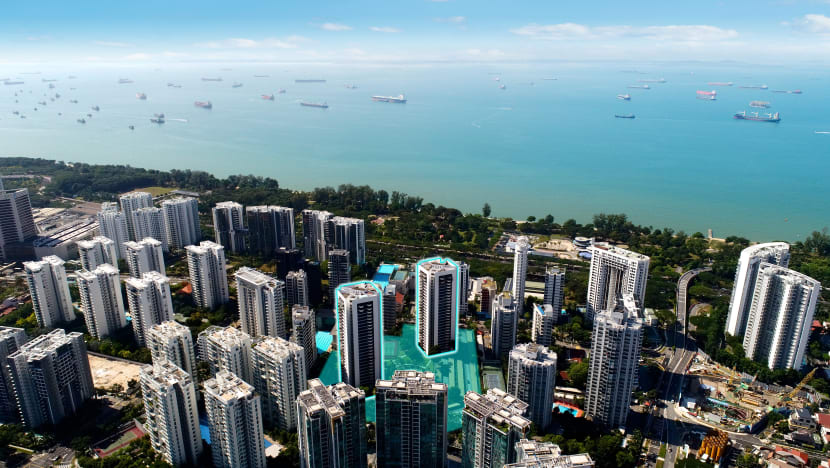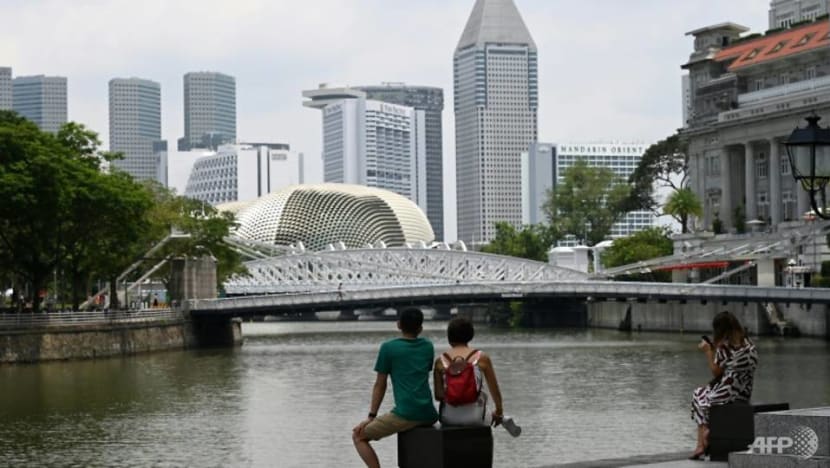Commentary: Property stamp duties and inheritance – could wealth taxes in Singapore come from these?
Careful attention must be paid to ensure the broad-based middle class do not end up bearing the bill, says NUS Business School Professor Simon Poh.

Amber Park was sold for S$906.7 million on Oct 4, 2017, in Singapore’s largest freehold en bloc sale by dollar value. (Photo: JLL)
SINGAPORE: Wealth tax has been a hot discussion topic in Singapore lately.
Should the Government shift its reliance on revenue from income tax and GST to wealth tax?
Maybe that 2 per cent GST hike won’t be needed if we can find new ways of collecting wealth taxes to generate a sustainable source of significant tax revenue, some have argued.
Few will dispute that wealth taxes conceptually contribute to a more progressive and fairer society. With growing consciousness over inequality, it is no surprise the idea of taxing the rich more is gaining traction worldwide, with Singapore no different.
While recent interest in the topic has been ignited by Finance Minister Lawrence Wong’s clear message at the 35th Singapore Economic Roundtable last Friday (Oct 15) that the Government will study the options to expand our system of wealth taxes, his clarification this will be done in ways that “add to our revenue resilience without undermining our overall competitiveness” outlines useful trade-offs worth stewing over.
This public debate is expected to heat up in the run up to Budget 2022, as public feedback is solicited.
A PUSH FOR WEALTH TAXES IN SINGAPORE
Some basic principles will continue to undergird Singapore’s review of taxes. We know the Ministry of Finance (MOF) studies Singapore’s overall tax system on an ongoing basis to ensure that it stays competitive and business-friendly yet remains fair, progressive, sustainable and hard to avoid.
When property taxes and stamp duty rates were raised to cool the residential market and rein in speculation in the past decade, more expensive properties commanded higher rates while commercial and industrial properties were spared to preserve the private sector’s competitiveness.
Wealth taxes, first raised in recent memory at Budget 2021 by Deputy Prime Minister Heng Swee Keat, have the potential to shore up Singapore’s fiscal position for the long term as the country continues to seize international opportunities and rebounds from the pandemic.
Singapore has primarily relied on taxing wealth through property-related taxes such as property taxes and stamp duties – which make a hefty chunk of government revenue.
The Inland Revenue Authority of Singapore latest annual report for the fiscal year 2020/2021 shows 14 per cent of the S$50 billion in taxes collected came from total stamp duties (8 per cent) and property taxes (6 per cent).
Such takings from wealth taxes could generate significant government revenue, fourth only to corporate income tax (33 per cent), personal income tax (26 per cent) and GST (21 per cent), if we leave out net investment returns contributions from the reserves.
HIGHER PROPERTY TAXES?
Considering the residential property market has been surprisingly resilient despite the pandemic, an increase in taxes on residential properties may be palatable. This has the additional benefit of setting the property market on a stronger foundation for sustainable growth.
The widening wealth gap across the world has been driven by property investments mostly, with the substantial value appreciation less available to those with lower incomes, Monetary Authority of Singapore Chief Ravi Menon said in his Institute of Policy Studies lecture in July.
Related:
“If price increases in private housing consistently outstrip that in public housing, wealth inequality will worsen over time, even if not to the same extent as in many other countries,” he said.
AVOID HURTING THE SANDWICHED MIDDLE CLASS
But could such wealth taxes applied bluntly impact the sandwiched, middle class?
Consider a home housing a big family with many dependents funded by a loan of 75 per cent of the house value.
Buyers will not only have to pay stamp duties, of 1 to 4 per cent, with higher rates after the purchase price exceeds S$180,000 but also annual property taxes which level progressive rates after the first S$55,000 annual value.
Compared to if dependents – including retired, elderly parents – lived separately in smaller HDB homes, such multi-generational households not only bear a higher property tax burden but also may not be eligible for means-tested benefits like GST vouchers.
Both taxes are collected in full even though the net wealth of the owner is effectively only a portion of the home value at the time of purchase.
Similarly, where vehicles have been seen as the second asset class wealth taxes can be levied on, a driver buying a car to ferry young children and seniors around on maximum hire purchase terms has to bear high additional registration fees.
Any progressivity in such taxes may be some consolation but this example serves to underscore how moves to derive government revenues based on indirect proxies of real wealth may be tricky.
The devil will be in the details. Levelling higher tax rates above a certain purchase threshold on more expensive cars or homes may resolve this conundrum - to include large residential properties like good class bungalows above S$20 million and luxury vehicles like vintage cars above S$500,000.
WHAT ABOUT BRINGING BACK ESTATE DUTIES?
Mooted most recently also by Mr Menon, there have been calls to bring back estate duty where taxes are levied on inheritances, which may appear to be progressive and fair.
In fact, estate duties have been described globally as “the most moral of taxes”. The trouble was its collection.
In Singapore, it narrowly covered only the top 3 per cent of estates paying taxes with collection was only about S$70 million each year - a drop in the ocean compared to the S$7 billion generated by property taxes and stamp duties.

The middle and upper-middle income groups were impacted disproportionately compared to higher income groups who had access to creative tax planning and ingenuous new schemes, leading the Government to abolish it in 2008.
While the issue may enjoy renewed and heated discussion, have the fundamentals changed for Singapore to revive estate duty? It doesn’t seem so.
In fact, many jurisdictions have similarly abolished such classes of taxes, including Australia, Hong Kong, Malaysia and New Zealand, to encourage overseas investors to hold assets in these places and promote their locations as attractive trust and asset management centres.
Likewise, after Singapore removed it, our economy and society benefitted as both Singaporeans and foreigners were encouraged to invest and build up wealth and retain them in Singapore.
WHAT DOES A "PURE" WEALTH TAX LOOK LIKE?
In its purest form, wealth tax should be a tax on the net wealth of an individual, looking at the combined value of his or her assets - cash, properties, shares, luxury items and anything with a monetary value less any liabilities such as housing and car loans.
It is, however, challenging and administrative tedious to design such a means-tested system given that an individual’s assets and liabilities may fluctuate over time and it may be hard to assess their fair market values.
The fact that most assets – jewelleries, antiques, cash – are mobile and can be easily moved to another location will further complicate the mechanism to determine the tax base.
Countries that have successfully implemented taxes on taxpayers’ net wealth include Switzerland and Norway. But the rates are modest, not exceeding 1 per cent for Switzerland and 0.8 per cent in Norway.
Still, for efficiency and ease of administration, leveraging existing taxes like stamp duties and property taxes to increase rates for higher thresholds is preferred compared to creating a new confusing class of tax.
TREADING CAREFULLY AROUND HIGH-NET WORTH INDIVIDUALS
Whichever route we take, calibrating the tax rates will be key to avoid impacting the attractiveness of Singapore’s wealth management industry – the biggest part of our financial service sector that has shifted towards catering to high-net worth individuals who also generate knock-on benefits for the economy.
There are at least 200 family offices managing around US$20 billion as of October 2020, after a five-fold increase between 2017 and 2019. They generate an entire ecosystem of jobs and demand in portfolio management, compliance, accountancy and other concierge services.
With Singapore’s bid to be investment friendly, we have attracted the likes of billionaire Ray Dalio and Haidilao founder Shu Ping to set up shop here.
Related:
In reviewing and expanding our system of wealth taxes, we must be clear about the objectives of raising a wealth tax.
DPM Heng was quite clear at Budget 2021 in putting to bed the idea that raising wealth taxes can override the need to raise GST specifically to shore up reserves and the intent for a “one-off tax” like Argentina to shore up Singapore’s post-COVID-19 fiscal position.
So is it to address wealth disparity like what Mr Menon suggested in his Institute of Policy Studies lecture in July? Mr Wong’s words about the “rich paying their fair share” suggests moral principles are behind the taxes may be instructive.
But perhaps it would be useful for MOF to clarify where these new sources of government revenues will be going so the rich too can see how paying more taxes benefits society and what other programmes have been made possible with wealth taxes.
Whatever form it takes, wealth taxes must not be set too punitively high nor thresholds too low such that the sandwiched class of taxpayers are affected disproportionately.
A parting shot is this: Modest wealth taxes will not likely lead the ultra-wealthy individuals to relocate. After all, let’s not forget we have many favourable non-tax factors attracting foreign investors to relocate here and Singapore residents to stay put.
This includes an excellent education system, a safe country with low crime rates, a respected rule of law, a strategic location free from natural disasters such as floods, earthquakes and typhoons and political stability, to name a few.
Simon Poh is Associate Professor (Practice) of the Department of Accounting at NUS Business School where he specialises in tax matters.




















